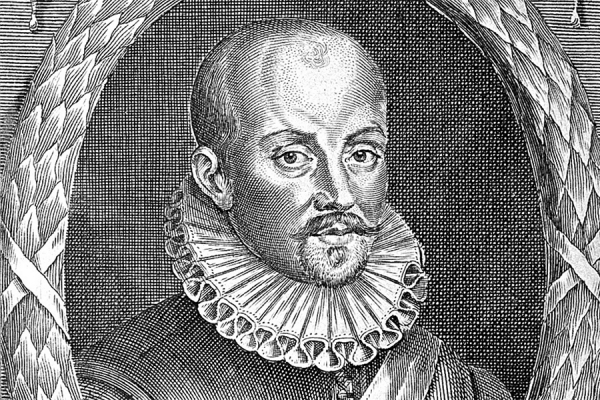 A graduate colloquium Dec. 13 will consider the essays of Michel de Montaigne.
A graduate colloquium Dec. 13 will consider the essays of Michel de Montaigne.
A graduate colloquium Dec. 13 will consider the essays of Michel de Montaigne.
 A graduate colloquium Dec. 13 will consider the essays of Michel de Montaigne.
A graduate colloquium Dec. 13 will consider the essays of Michel de Montaigne.
A graduate colloquium Dec. 13 will consider the essays of Michel de Montaigne.
 A Nov. 28 workshop will offer advice to graduate students applying for scholarships.
A Nov. 28 workshop will offer advice to graduate students applying for scholarships.
 A colloquium Tuesday, Dec. 4, will explore the works and world of 17th-century poet John Donne.
A colloquium Tuesday, Dec. 4, will explore the works and world of 17th-century poet John Donne.
A colloquium Tuesday, Dec. 4, will explore the works and world of 17th-century poet John Donne.
A graduate colloquium Thursday will explore the history of interpretation from antiquity to the present.
 Steven Palmer, Canada Research Chair in History of International Health, organized this week’s conference on Knowledge Networks and Health Innovation.
Steven Palmer, Canada Research Chair in History of International Health, organized this week’s conference on Knowledge Networks and Health Innovation.
Steven Palmer, Canada Research Chair in History of International Health, organized this week’s conference on Knowledge Networks and Health Innovation.
English professor Stephen Pender will deliver the first lecture in the 2014/15 Martin Wesley Series on Wednesday, October 22.
Stephen Pender loves literature.
That might seem like a fairly obvious statement for an English professor to make, but according to an article recently published in University Affairs magazine, many literary scholars have become ambivalent about their  raison d’être.
raison d’être.
The University of Windsor will be well-represented at BookFest Windsor, October 25 to 27 at the Capitol Theatre and Arts Centre.
Members of the UWindsor faculty will join a number of alumni for the event, a celebration of the literary arts that will feature workshops and discussion, readings of poetry and prose, book signings and socials.
Among the professors—both past and present—who have committed to appear are Marty Gervais, Susan Gold, Karl Jirgens, Martha Lee, Nicole Markotić, Eugene McNamara and Stephen Pender.
What can contemporary scientific psychology, barely 150 years old, teach us about the emotions that literary and philosophical inquiry cannot? A symposium on the UWindsor campus April 20 and 21 will bring scholars from around the world to explore that question.
Psychology, Emotion, and the Human Sciences is sponsored by the Centre for Research in Reasoning, Argumentation, and Rhetoric and English professor Stephen Pender, research leadership chair in the Faculty of Arts and Social Sciences.
In 1575, the Spanish physician Juan Huarte recorded an encounter with a “rude countrie fellow who made very eloquent discourse” after becoming frantic. According to Huarte, this oratory sprang directly from the man’s fevered state.
In a free public lecture Wednesday, English professor Stephen Pender takes seriously Huarte’s assertion — eloquence is a matter of heat rather than cognition, imagination or memory — and explores an ensemble of neglected ideas in early modern medicine and rhetoric.